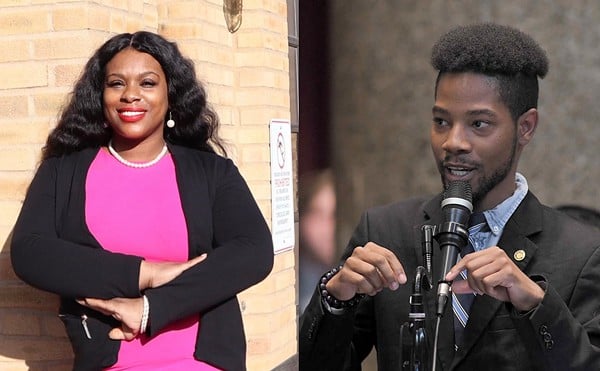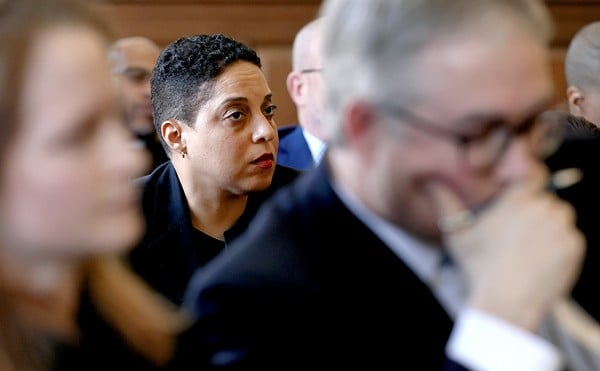In those days, a MAC membership represented somewhat of a coup. There was a waiting list. Applications were reviewed by a membership committee that dismissed the undesirables and weeded out anyone their fellow clubgoers didn't like. The MAC was a whites-only club for nearly half a century and didn't admit a woman until 1989. (Men persisted in swimming nude in the lap pool and retained sole privileges to the other athletic facilities until the early 1990s.) Today it's much easier to join; pretty much all one needs is two sponsors, a clean police record and the initiation fee, which ranges from $600 to $2,000. Memberships cost an additional $1,100 to $3,000-plus.
In search of a revenue infusion in 1992, the club recruited a new general manager, Larry Thompson, former head of the Milwaukee Athletic Club and a lifelong hospitality hand. Thompson worked hard to boost female involvement. Last year, the Club Managers Association of America named Thompson Club Manager of the Year. A meet-and-greet sort who clearly prefers pressing the flesh to holing up in his mezzanine office, Thompson is modest in citing the MAC's gains. He won't share specifics about membership growth, but he is emphatic about one point: "There are probably hundreds of people who pass this club every day in their automobiles and on foot who say, 'What goes on in there? Probably the same old things.' It's not true."
He's referring to frat-boy traditions of old, like one that used to take place the night of board member elections: Candidates would man makeshift booths in the lobby to hustle votes. A dinner followed -- then strippers. One year, about two decades ago, a board member got upset and called the police, according to a former board member who declined to be named in this story. That was the end of the adult entertainment, the ex-board member says.
Thompson wants to make it clear that the elitist playboy antics that once held sway are a thing of the past. "This is a good place to work," he says, wagging a finger. "And I say that not as the general manager. I say that as an employee."
One former staffer, however, disagrees. Ex-MAC waiter Tracy Gilliland has filed a lawsuit in state court in St. Louis claiming he was the victim of gender- and race-based discrimination while working at the club. Specifically, Gilliland alleges that a male supervisor sexually harassed and assaulted him, and that higher-ups passed him over for promotion because he's white.
Gilliland says he took a job at the MAC in 1999 after being sold on the place by the wife of a staffer. The divorced father of two was waiting tables at another downtown restaurant but was seduced by the MAC's proximity to his home, not to mention the club's comprehensive healthcare plan, a boon in the food-service business. "It seemed like a step up," he says today.
Gilliland says he started as a bartender at the MAC, then became a waiter. He was paid about $2 an hour plus a guaranteed 15 percent gratuity on each table during regular meal services, he says. Parties or weddings netted about $9 an hour. His aim was to work his way up to the role of trainer, a maître d' of sorts who can take home three times what servers get.
The MAC's ten-story edifice at 405 Washington Avenue houses two restaurants and numerous banquet rooms. Gilliland worked predominantly on the first floor, where he says he served "local business walk-ins -- lawyers, judges, bankers." He longed for shifts at the fourth-floor restaurant, where "the older crowd" settled in for homemade beef-barley-mushroom soup and fried sole sandwiches; a regular clientele and bigger tables upstairs promised higher earnings.
According to Gilliland's suit, filed in late 2003, "The fourth-floor restaurant is better known to respondent MAC's employees as the 'Blackberry Inn' because only African-American employees are permitted to hold positions there." Gilliland further claims that in December of 2001 he was passed over for a promotion to trainer in favor of a "less-qualified" African-American female with only four weeks' experience at the club, even though supervisors had previously told him he was "next in line" for a trainer position.
Gilliland, who is gay, alleges that the MAC's management failed to respond to his complaints that a married male supervisor, Vince Millen, was sexually harassing him. From the time he began work at the MAC, the suit claims, Millen would grab and pinch his nipples and press into his buttocks and simulate anal sex.
"I'm not a touchy-feely person," says Gilliland, now 40.
Soon after being turned down for the promotion, Gilliland filed a complaint with the city's Civil Rights Enforcement Agency. Nine months later, on November 13, 2002, he amended the claim to include an allegation of sexual harassment at the hands of a supervisor. The lawsuit describes the incident in detail: In early August of 2002, the suit alleges, Miller pinned him against a computer desk from behind, thrust his groin into Gilliland's backside and "[said] he should not be such a 'hard ass' and to just drop his complaint of discrimination."
That same day, Gilliland says, he told club management he intended to quit.
Gilliland says his experience at the MAC was psychologically devastating and drove him to see a psychiatrist for the first time in his life. "I didn't get out of bed. I didn't care if I brushed my teeth." Gilliland says he was unable to work for a year afterward. His partner of eight years took care of the bills, including Gilliland's child-support payments.
In August 2003 the Missouri Commission on Human Rights responded to Gilliland's civil-rights complaint against the athletic club, giving him the go-ahead to sue. (State law requires that before filing a discrimination lawsuit against one's employer in Missouri, a citizen must lodge a complaint with a local civil-rights agency. If the agency fails to rule on the case within six months, the petitioner is notified he has the right to sue.) Employment lawyer Kurt Cummiskey filed Gilliland's lawsuit in November of that year, and it has been making its way through the requisite red tape ever since. Cummiskey says he plans to request a jury trial at the next hearing, scheduled for January 24. "That's the only way we can correct the things that happened to Tracy," asserts the attorney.
Vince Millen declined to comment for this story on the advice of the athletic club's attorneys. MAC attorney Matthew Robinson declined to comment. MAC officials have consistently and categorically denied Gilliland's allegations. "The charges are unfounded, end of story," says general manager Larry Thompson.
Gender-law experts say Gilliland faces an uphill battle.
"Many courts treat male-on-male harassment cases as 'sexual harassment lite,'" says Nancy Levit, a law professor at the University of Missouri-Kansas City and author of The Gender Line: Men, Women and the Law. Levit says courts often rule in favor of defendants because "they think of male-on-male cases as just teasing, roughhousing and horseplay."
Pauline Kim, a law professor at Washington University, calls sexual harassment "a mess." Title VII of the Civil Rights Act of 1964 bars discrimination on the basis of sex, and court decisions handed down in the 1980s used the act to include sexually tinged harassment between males and females, Kim says. In 1998, in Oncale v. Sundowner Offshore Services, the U.S. Supreme Court opened the door to same-sex harassment complaints. In that case, a roustabout on an oil rig claimed he was subjected to humiliating, sex-related taunting by two male supervisors and a male co-worker and threatened with rape. In a unanimous opinion, the justices held that a victim of same-sex sexual harassment would have to prove one of three conditions: that the aggressor was sexually motivated, that he hates his own gender or that he treats members of the opposite sex differently from those of his own.
"What gets lost in that [Supreme Court opinion] is a focus on whether the behavior of the harasser is appropriate and should be tolerated," says Kim. "The courts are asked to answer whether the harassment took place in the context of sex, not in the context of intolerable behavior."
Kim and others say they'd be hard-pressed to cite same-sex discrimination precedents set by Missouri courts. In two recent cases at the federal level, the defendants prevailed. In the most recent suit, resolved in 2003 two days after Gilliland sued the MAC, a construction worker at St. John's Regional Health Center failed to prove that his supervisor's grabbing, grinding and lewd comments constituted harassment.
"We thought the facts would be shocking to a judge or jury," recalls Jeff Merrell, the construction worker's attorney. In the wake of the verdict, Merrell says, he believes that finding facts sufficient to prove same-sex sexual harassment is "like finding a needle in a haystack."





